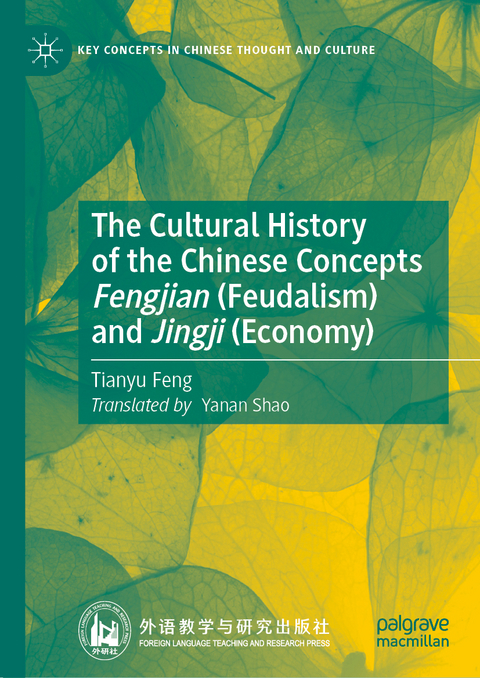
The Cultural History of the Chinese Concepts Fengjian (Feudalism) and Jingji (Economy)
Springer Verlag, Singapore
978-981-99-2616-9 (ISBN)
This book is both scholarly and readable, satisfying both the academic needs of specialized researchers and the cultural curiosity of those with secondary education or above.
Feng Tianyu (January 12th, 2023), an expert in Chinese culture and history, senior professor at Wuhan University, who used to be the director of Research Centre of Chinese Traditional Culture at Wuhan University (the Key Research Base of Humanities and Social Sciences of Ministry of Education) and the head of the Innovation Base of Chinese Traditional Culture and Its Modern Transformation. He was the member of the Social Science Committee of the Ministry of Education, vice-president of Association of Chinese Historians, deputy director of Academic Committee at Wuhan University, and deputy chief-editor of local chronicles of Hubei province and Wuhan city. In recent decade, Prof. Feng focused on the study of the modern transformation of Chinese culture under the circumstance of the interaction between Chinese and Western cultures. His works achieved the first prize of China Book Award, the second prize of Outstanding Achievements in Humanities and Social Sciences Research from Ministry of Education and other prizes. Some of his papers have been published abroad in foreign languages, such as in Japanese, English and Spanish.
Introduction.- Part I Fengjian (Feudal).- Chapter 1: Composition of the Classical Chinese Term “Fengjian”.- Chapter 2: The Zhou Fengjian System of Decentralization and the Qin System of Monarchical Centralization.- Chapter 3: The Concept of Hōken (封建)in Early Modern Japan.- Chapter 4: A Discovery of the Similarities between Fengjian and Feudalism.- Chapter 5: Establishment of the Concept of Feudalism in Western Europe and Its Encounter with Feudalism in East Asia.- Chapter 6: The New Term “Fengjian” in the Late Qing and Early Ming Dynasties.- Chapter 7: The Alienation of the New Term “Fengjian”.- Chapter 8: Generalization of the Concept of “Feudalism”.- Chapter 9: The Truth about Marx’s Theory of Feudalism.- Chapter 10: Criticism of Generalized Feudalism by Chinese Scholars.- Chapter 11: Patriarchal Landowners’ Authoritarian Society and the Age of Imperial Power.- Part II Jingji (Economy).- Chapter 12: The Classical Meaning of “Jingji”: Governance for the People.- Chapter 13: Jingji as Envisaged in the Studies for Practical Solutions in China and Japan in the Near-Ancient Period: The National Economy and the People’s Livelihood.- Chapter 14: The Evolution of Ancient and Modern Meaning of Economy in the West until It Was Finally Settled.- Chapter 15: Translation of Economy into Keizai in the Late Edo Period and during the Meiji Period.- Chapter 16: Modern Japan Doubted about the Translation of Economy as Keizai and Tried Other Alternatives.- Chapter 17: The Rejection of Japan’s Translation of Economy as Keizai by Chinese Scholars in the Late Qing Dynasty and Their New Alternatives.- Chapter 18: The Early Republican Period: Establishment of “Jingji” as the Translation of Economy in China.- Chapter 19: Examination of Jingji in Its Present Sense.
| Erscheinungsdatum | 09.08.2023 |
|---|---|
| Reihe/Serie | Key Concepts in Chinese Thought and Culture |
| Übersetzer | Yanan SHAO |
| Zusatzinfo | 12 Illustrations, black and white; XV, 157 p. 12 illus. |
| Verlagsort | Singapore |
| Sprache | englisch |
| Maße | 148 x 210 mm |
| Themenwelt | Geschichte ► Teilgebiete der Geschichte ► Kulturgeschichte |
| Geschichte ► Teilgebiete der Geschichte ► Wirtschaftsgeschichte | |
| Geisteswissenschaften ► Philosophie ► Östliche Philosophie | |
| Wirtschaft ► Allgemeines / Lexika | |
| Wirtschaft ► Volkswirtschaftslehre | |
| ISBN-10 | 981-99-2616-5 / 9819926165 |
| ISBN-13 | 978-981-99-2616-9 / 9789819926169 |
| Zustand | Neuware |
| Haben Sie eine Frage zum Produkt? |
aus dem Bereich


